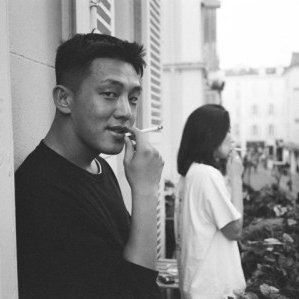
This review may contain spoilers
This was surprisingly very bold considering it was a TV Show. Comparing this to the movie of the same material, this had a more daring story despite lacking the nudity that the movie had. The elements of the women/women relationship were done with reverence and respect. It was very adult and frank. When Yun Bok was revealed to be a woman to Jeong Hyang, the love remained. Likewise with Hong Do, although the roles in this circumstance were switched. Painter of The Wind was able to do so many things but the key details of the complexity of both relationships was captured magnificently, allowing for such a strong core plot to carry the show forward. In addition to the core, Painter Of The Wind was able to fully develop the world of Artistry and Dohwaseo, showing the history of the society and their important place within the world of Joseon. I found myself truly invested in the competitions and the stakes that were at hand, so much that my heart was racing rapidly during the final competition between Hong Do and Yun Bok. Where the story faltered a little. It really didn’t explain the link between King Jeongjo’s search for Prince Sado’s portrait and the death of Yun Bok’s father in a clear manner. At least not a way that I fully accepted without no question. The political nature of that conspiracy was a little lost to my ignorant ears. The performances were excellent throughout the cast. Moon Geun-young had earned the Daesang for the SBS Awards and Best Actress for Baeksang Arts Awards, and while I perhaps need to look at the other candidates for those awards, she earned it with her leading role as the man-dressed female painter. Her counterpart, Park Shin-yang, had more comedic elements than serious ones in his character, the famed artist, Kim Hong-Do. She had to contend with the dramatic love-stories, the tragic past aspects of her character and the light cheerful nature that her character possessed, making it all come off like a complex singular person rather than a mix-match of emotions. She and Moon Chae-won, a ginseng, had magnificent chemistry on screen, more than plenty of male/women pairings have, enough to win Best Couple. A magnificent achievement. It made Moon Chae-won a rising star in the Korean television world which led to breakout roles in the next several years. And of course, the reliable Bae Soo-bin was great as the King who brought honour to his discarded father.
What else could I say? This is an immense period piece. For what it may lack of a historic value that Dong Yi provided in the two years later, this was still able to tell a magnificent, heartfelt story.
Was this review helpful to you?

Was this review helpful to you?

Was this review helpful to you?
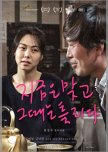
Was this review helpful to you?
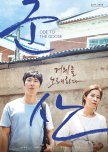
This review may contain spoilers
There was quite a lot of messages in this film. But what really stood out to me was the message regarding Chinese-Korean citizens, which given the director's heritage isn't that big of a surprise. I liked most of the elements of this film, the performances were quite mesmerising and helped carry this ambigious film that I still can't figure out (evem after rewatching a few scenes). The ending (well, the middle) allows for an open interpretation for what happened. Even when given further background to explore, there is still an underlingering uncertainty to it all. Watch it and judge it by yourself. Was this review helpful to you?
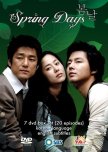
This review may contain spoilers
Side note: I love seeing these old dramas with plots and elements that still heavily influence the modern day dramas. The use of amnesia is an integral part of the story of Spring Day. But the plot felt truly earned and it never once felt like a lazy plot device as it had a real impact on how the rest of the show was mapped out and was concluded throughout the show rather than it being done in a few episodes, quickly forgotten about. It’s nice. The synopsis is vague and misleading, although it’s true in some ways. While Seo Jung Eun has a relationship with the brothers, there is more nuence to the story. Spring Day goes deep into portraying the many different types of love that one could have, and the ways of showing that love. And it's not just the triangle with Jung Eun, Eun Sub, Eun Ho. The way Kim Kyung Ah and Kim Min Jung show it is unique to them. Eun Sub claims many times that he doesn’t love Kyung Ah but the way he worked to get her out of debt (and danger) shows that he did to an extent. She thought so too. Even Eun Sub and dad had their own ways of expressing it. This had many interesting thoughts on the subject. The love triangle was somewhat complex and nuanced with each step carefully taken to set each option up and end it in a way where we come satisfied, which is difficult. Here’s my take on it: Jung Eun appericed what Eun Ho did for her, bringing her out of her shell and giving her reason to live on but she didn’t truly love him. She never once said that she was and whenever the topic came up, she’d brush it off or it’d feel forced. Sme with
Eun Ho to her. He liked what she represented, being similar to his long lost mother but not her. However Jung Eun and Eun Sub were truly in love. Their first interaction was a special one where they bonded together even while one was sleeping. The attraction was instant. They only developed it more and more as they spent time with each other, which Jung Eun & Eun Ho didn’t do. One was a pipe dream, one was more rooted in reality.
Eun Sub is such a fascinating character. He is emotionally driven, he cries a lot, screams in anguish when he’s unhappy or sad. There is a lot of hidden trauma to his character, same with Jung Eun which is why they work better. There were many subtleties to the relationship and its characters that can only be captured with incredible performances which this had in abundance. He, like the rest, was highly flawed but he wasn't a bad person. He is such an interesting character and one of the reasons why I liked Spring Day so much. Eun Ho was less flawed but there wasn't the same depth to him unlike Eun Sub. Once his arc with the amnesia storyline concluded, his character got somewhat dull and lame to me. I wonder if that was done purposely but the 3rd act for him isn't a compelling one. I do think the 3rd act did drag as well. Some of the most captivating parts of the show were the setup and character building which makes sense given how character driven this is. Spring Day is out the people involved and the cting, rather than the story which was effectively done, too.
I’d recommend this to anyone. It had a lot of things to say and interesting ways to present that.
Was this review helpful to you?
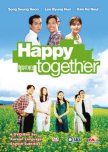
This review may contain spoilers
First, let me talk about this cast. Lee Byung-hun (JSA, Iris), Song Seung-heon (You & I, East of Eden), Kim Ha-neul (Piano) and Jun Ji-hyun (My Sassy Girl, My Love from the Star). All big stars, or were at one point. And the supporting cast for this has Cha Tae-hyun and Cho Jae-hyun. Korean dramas weren;t at their peak of the ‘Korean Wave’ but for well known actors starring in the small screen, this is a pretty top period. Most of these names are still fairly big, due to movies or later dramas. Some have simmered down from their earlier status but still retain a respectable career. Either way, it’s a privilege to have a show in this era, in wide circulation.Happy Together is about 5 people who are related in some way, through marriage or blood, that find themselves at odds with each other. The leading man is Lee Byung-hun, as Seo Tae-poong, an ageing underachiever in Baseball, who longs to bring his siblings back together after he got separated from them following the death of his parents. 3 of the siblings still live together but lead different lives and barely co-exists, Tae-poong is considered an outcast, hardly a brother and there is a younger sister that they both think is lost to them forever. And while Tae-poong’s attempts to bring the family back together aren’t appreciated, the family goes through a tremendous growth, not only as individuals but as a family. It’s a simple premise and a plot. There are added themes about prostitution and gang life through some of the main characters, such as Seo Moon-joo (Kang Sung-yeon) and Jo Pil-doo (Cho Jae-hyun), but the family is the true crux of the story. Even the love triangle is an extension of the story between the two brothers of the family (Lee Byung-hun & Song Seung-heon) The whole trope of an illness for one of the characters isn’t terribly overused by this point and is used to bring the family closer, opposed to Beautiful Days (2001) or Stairway to Heaven (2003). It’s a concise drama that doesn’t go too bold with its storytelling while retaining heart and a good earnest message about family.
Don’t expect a big revenge or love story but expect to be pleasantly surprised by this drama. 16 episodes long and it went by like *clicks fingers*.
Was this review helpful to you?

Was this review helpful to you?

This review may contain spoilers
When they kissed, I felt it. Right there is the momentum when the film came together. The first part of the film is a documentary piece about the town Gojo City, where a tour guide and tourists see the sights and the residents of the city, who have their tales of their experiences in the town, mostly about love. While it was initially boring (and I can see others thinking the same), it sets up the second part that’s a pure fictional piece that resembles some of the stories we’ve heard before. Kim Sae-byuk and Iwase Ryo fall for each other but Kim Sae-byuk has to return to Korea, return to her unhappy relationship, leading to one of the saddest goodbye kisses you can see in indie cinema.
Was this review helpful to you?

Was this review helpful to you?
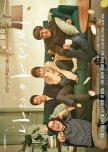
"You're Nice".
There was something profoundly heartfelt about My Mister. This is a drama - a true drama - about pitiful people for pitiful people. Our main characters are essentially losers, outcasts, jokes amongst their peers. However we learn vital lessons through their actions, we hear healing stories as well as heartbreaking ones.Park Dong Hoon is the man everyone wants to be while also being the man no one wants to be. No one is more genuine and honest than Dong Hoo, but that affects his life in a huge way. No set of brothers are so close to each other that when one is sad, they are all upset by proxy and feel guilt at any form of happiness. That bond is unbreakable. And thus, this affects his home life with his wife feeling isolated, lonely and, herself, an outcast. Of course, this leads to her being unfaithful with one of the few people Dong Hoon dislikes. But My Mister is so much more than a story about infidelity. It's about the hardships of life. Nothing is more evident than his relationship with a subordinate, Lee Ji-Ah. A broken person who is stuck in a life of debt, pain and frustration. Lee Ji-Ah spy's on Dong Hoon because of the affair under the orders of CEO Do Jun-Yeong, who is sleeping with Kang Yui-hi, Dong Hee’s wife however she develops love for Dong Hee in the process and begins to help him in this struggle. Is My Mister about romance? No, but there is a clear returned love between the two characters, as shown through dialogue and visual storytelling in Dong Hee’s case. But again, there is a maturity to the relationships as well. My Mister is so multi-layered in that regard. Outside of our main story of lust and politics, there is the comonardary with the brothers and the neighbours friends of Dong Hee. And the subsequent stories that are splintered off and are given just as much meaning and purpose to the story as Dong Hee’s climb to the top. There were so many characters, so many plots that were quite frankly perfectly executed and mapped out flawlessly.
Every episode felt like a movie in itself. There was a long run time with each episode which was risky because it can feel long winded. However the lengthy time run only made me feel more immersed in the story. It made me feel a part of everything. When it was sad, I felt it. When it was happy, I was happy. My Mister played with your emotions. And that was thanks to the immaculate performances from each character. IU and Lee Sun Kyun especially. Kim Young Min as Jun-Yeong as well. It's difficult to pick out certain people because this was truly a team effort.
My Mister was very sentimental, sad and euphoric at the same time.
Was this review helpful to you?
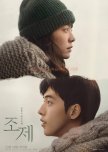
This review may contain spoilers
Something films leave you with lingering emotions as the credits roll. That has you slowly pondering about your own life or anything significant in general. Josée was a very calming movie about a tender loving relationship between a wheelchair bound and a poor college student. Josée is a bit of a wonder. We don't know her real name, only what she calls herself, why she is in the chair and her wild imagination leads her to tell different stories about her origins and what she has done. The film takes us on a journey seeing Josée take the steps to find joy and happiness outside of her lonely, isolated life through Young-seok. Our characters slowly drift apart towards the end, still loving each other but in a better, stable and healthy place in their lives, keeping our hearts at bay. The cinematography, whether it was the initial darkness of the surroundings that slowly turn bright as our characters grow, the background weather and various locations used was all great. It fit the subtle tone that the film is presented with. Han Ji Min and Nam Joo Hyuk are splendid as our respective roles. Heartfelt and sincere from the heart. They are the true reasons why this film was so touching in many ways. Was this review helpful to you?

This review may contain spoilers
I liked watching it but I can't say that it's good
The story is good in theory. Clichéd? Yes. Unrealistic, even by K-Drama standards? Yes. But it's a fine story to have these characters interact with each other. However it's lacking substances and sense at times. Characters say things just because. Suggested feelings disappear suddenly (Hyun Min not being interesting in Ha Won suddenly was a total mind-f*ck for me. They set up another person to like, which is a mess of a plot by itself, but they have big relationship moments for the first quarter of the series before it's dropped). The title is misleading as there is no 4th Knight. None at all. It's a clever name but it makes no sense. It's not even hinted at as a possibility either. The family abuse plot is irritating for all the wrong reasons. I swear it was only there to draw further comparisons to the title name. One thing I do think is done well is Ji Woon's arc. Whether it be the main relationship with Ha Won or his struggle to accept that he is now apart of a rich family and has expecations to uphold, I thought that was something that you could bite on. The bastard child trying to reject his family instead of the opposite is an interesting plot. He and Ha Won work best out of the three potential guys too. Again, the Ha Won/Hyun Min plot is dropped in a jarring way to the point where the love triangle no longer exists past episode 5/6 but they went the right choice for who is more suitable. Seo Woo is a cool character. He's talented, smart, has good intentions but he does feel like a lost wheel and unnecessary as a whole. The plot is just riddled with problems. The characters are fine enough to keep you engaged for the whole runtime, even if they aren't given much depth. Oh well, at least we have Kim Yong Gun in his natural role as the malignant CEO Kang to keep some consistency.Was this review helpful to you?
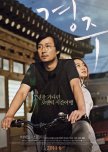
This review may contain spoilers
An interesting movie about multiple themes such as gried, loss, disenfranchisement with patrioitism. Our male lead, Choi Hyeon, is a Korean who has been living in China as a professor, back in Korea for a funeral and finds himself different. He is totally unsure how to handle himself when faced with seemingly normal south korean customers. The "Century" scene lends credence to how out of the box he is compared to his fellow Koreans. Uncaring about the potential outbreak of war, serious about an impractical life expectency for the North Korean Supreme Leader (which lends credence to the theories that Choi is actually a North Korean spy/defactor). The dealing with loss and pain aspects are done really well. Shin Min-ah as Gong Yun-hee, a tea-house owner that Choi meets while venturing around Gyeongju, puts in a great subtle performance fitting of the independent style film Zhang likes to do. Was this review helpful to you?
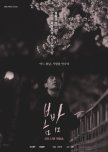
This review may contain spoilers
Naturally, this will draw comparisons to Something In The Rain. Similar backroom staff, same male lead, similar vibe in the story but this plays out much smoothly and has a way more satifying ending. The love story is heartfelt and relatable even if you're not in the same situations. The ordeal with the parents and side characters is more bearable and fleshed out. I like that there was no real villain. Ki Seok's character is bullish and arrogant but in some way, he's still down to earth and you can feel for him at times despite the character's stalkerish tendencies. The marriage proposal was wonderfully laid out. It was so casual yet loving and perfect. Getting the kid to do it for you - a magical moment. The acting was super strong and nuanced. I can't rag on any of the cast for their performances. Whether it was the leads or the side characters, everyone had a distinct, interesting character. Everything seemed to natural and seemless. I had no probably parashuting into this world and accepting the characters for their choices.
The soundtrack might cause a few debates. The song list is limited but the songs are memerable and add to the scenes they are used for. That's all that's required.
I think the re-watch value is in the Jung Hae-In and Han Ji Min chemistry and on-screen relationship. Every scene is worth watching with them in, from the beginning of a reluctant friendship to a blossoming relationship.
Was this review helpful to you?

